#Tarentum
Text

Enthroned Deity, So-Called Goddess from Tarentum (detail)
This marble bust of a Deity - probably a Goddess - comes from either Tarentum or Locri, Southern Italy, and dates back to approximately 470-450 BCE.
The Deity depicted is not entirely known due to lack of definitive symbolic attributes. Possible choices include but are not limited by Hera, Aphrodite, or Persephone whose worship was prominent in the South of Italy. It is possible that the statue used to serve as a cult image in one of the Southern Italian sanctuaries.
Source: 🏺
#ANTIGÜEDADES 💎#ancient art#ancient sculpture#locri#tarentum#Personally I'm gonna bet money that it's Persephone because Sicily was BIG BIG on her and her story takes place there- but who knows.
8 notes
·
View notes
Photo
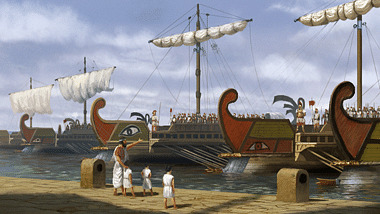
Voyager dans le Monde Grec Antique
Les possibilités de voyage dans le monde grec antique dépendaient en grande partie du statut et de la profession d'une personne; néanmoins, une proportion importante de la population pouvait voyager, et le faisait, à travers la Méditerranée pour vendre des marchandises, des compétences, faire un pèlerinage religieux, assister à des événements sportifs ou même voyager simplement pour le plaisir de voir les magnifiques sites du monde antique. Les voyages n'étaient cependant pas toujours prestigieux, et trois autres groupes importants qui voyageaient également loin de leur patrie, généralement contre leur gré, étaient les envoyés politiques, les esclaves et les soldats, en particulier les mercenaires.
Lire la suite...
2 notes
·
View notes
Text
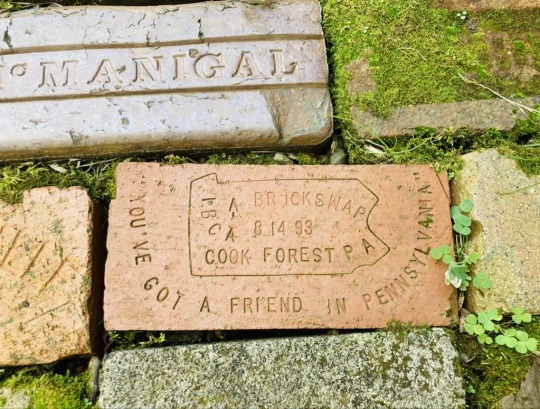



Brick garden at the steam engine fairgrounds in Portersville.
52 notes
·
View notes
Photo



























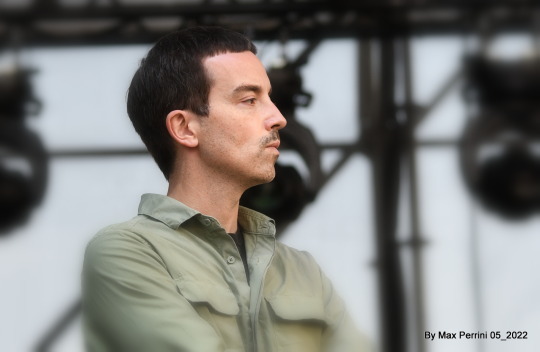





































#taras tarentum#taranto#concerto primomaggio#primomaggio#libero#pensante#lavoratori#nikon#nikonD500#tarentum#concerto#concertone#parco#parcomuragreche
0 notes
Text
On a Realistic Cow Statue
Anthologia Palatina 9.719 = Leonidas of Tarentum (fl. 3rd cent. BCE)
Myron didn’t sculpt me – that’s a lie. As I was grazing
He drove me from my herd, bound me to a base of stone.
οὐκ ἔπλασέν με Μύρων, ἐψεύσατο: βοσκομέναν δὲ
ἐξ ἀγέλας ἐλάσας, δῆσε βάσει λιθίνῳ.
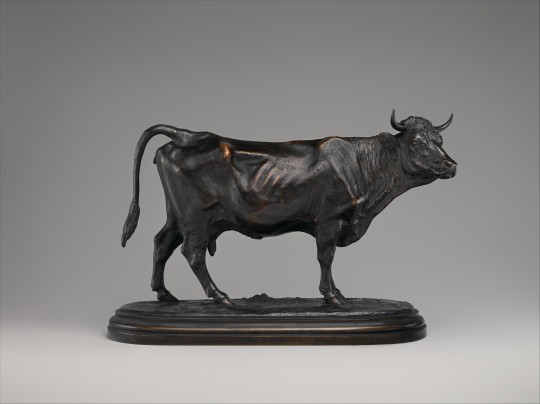
Cow, Isidore Bonheur (1827-1901)
#classics#tagamemnon#Greek#Greek language#Ancient Greek#Ancient Greek language#langblr#translation#Greek translation#Ancient Greek translation#poem#poetry#poetry in translation#Greek poetry#Ancient Greek poetry#Ancient Greece#Hellenistic period#Hellenistic poetry#Leonidas of Tarentum#epigram#ecphrasis#ecphrastic epigram#couplet#elegiac couplets#Anthologia Palatina#Palatine Anthology#Anthologia Graeca#Greek Anthology#Isidore Bonheur
295 notes
·
View notes
Text
Greek philosopher Aristoxenus of Tarentum first theorized the existence of procrastination in the 4th century BC in a now lost work, “Mantinean Character.” However it wasn’t until centuries later that John Scotus Eriugena made any effort to elaborate on the phenomenon. After years of contemplation and countless delays, Eriugena eventually penned a groundbreaking but unfinished treatise titled "The Elusive Art of Prolongation."
#tall facts#procrastination#greek philosophy#aristoxenus of tarentum#john scotus eriugena#did you know#today i learned#til#fun facts#fun fact#random facts#random fact
3 notes
·
View notes
Text
Deer Lakes Park
Exploring the Beauty of Deer Lakes Park: A Family-Friendly Oasis Near Pittsburgh
Are you looking for an outdoor retreat that offers a plethora of activities for the whole family? Look no further than Deer Lakes Park, a stunning 1,180-acre park nestled in West Deer and Frazer townships, just a short drive from Pittsburgh. Offering a wide range of attractions, from fishing lakes to hiking trails,…

View On WordPress
1 note
·
View note
Text
I love Ronald Syme's theory that Agrippa married Attica in 37 BCE, because it suggests:
That at the age of 26, Octavian was on wife #3 while Agrippa was either like, "No thanks," or "Gaius, how are you finding the time?"
That Mark Antony probably discovered Agrippa still wasn't married during negotiations for the Treaty of Tarentum.
That in between calling Octavian a leg-shaving fruitcake and trying to feed him to pirates, Antony found time to play matchmaker for Octavian's best friend. It is not clear whether Agrippa wanted him to do this.
That Agrippa had to explain to Octavian why Antony kept dragging him away from the negotiating table to meet girls.
Which means Octavian - and likely Octavia - would've been consulted on the girls Antony was proposing for Agrippa, all while Antony was Octavian's brother-in-law and Octavia was trying to get them back together (as triumvirs). And Antony still hadn't decided whether to save Octavian's ass or let Sextus Pompey wreck him.
That suddenly Agrippa's love life (or lack thereof) was a matter of national diplomacy.
That Agrippa's marriage thus took on a weird parallel to Octavia marrying Antony for the Treaty of Brundisium - or almost did, because apparently he told Antony "Not a senatorial family." Even though that would've increased Agrippa's political influence.
(I am getting the impression that Agrippa did not want to get involved in political/interpersonal drama more than he had to. Or he might not have wanted to be obliged to any families other than Octavian's.)
(Was Antony hoping to flip Agrippa to his side with cute girls or a marriage alliance?? Sorry Ant...)
Mark Antony decided the next best option was Atticus' daughter - Atticus, best friend of Cicero, whom Antony and Octavian had killed.
That must have been one hell of an awkward wedding party.
We don't know much about Attica's feelings, but Agrippa and Atticus actually became great friends, perhaps because they could commiserate over their other friends being absolutely bananas.
#marcus agrippa#mark antony#octavian#octavia the younger#titus pomponius atticus#jlrrt essays#just roman memes#pomponia attica
86 notes
·
View notes
Text
The Battle of Leipzig, October, 1813
By mid-October, Napoleon gathered all his forces near Leipzig, where on the 16th the started a battle that would later be called the Battle of the Nations .
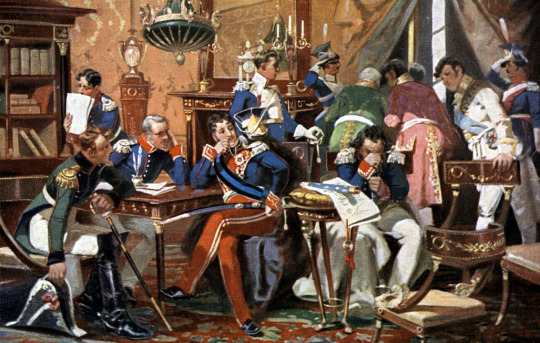
Jan Czesław Moniuszko, Prince Józef at Leipzig
Commanding the Poles incorporated into the Grand Army as the 8th Corps, Prince Joseph defended the village of Markkleeberg south of the city. As he reported to Napoleon, on the 16th
"the enemy did not gain an inch of ground […] the army showed admirable zeal and endurance […] but I lost 1/3 of my men and I have no ammunition."
And on that very day, the 16th of October, the Emperor appointed Prince Poniatowski a Marshal of France, with the official nomination taking place a day later.
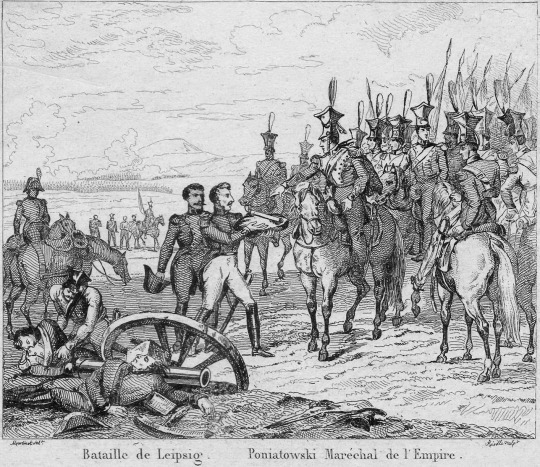
Prince Józef Poniatowski being presented the marshals baton, Reville's engraving after Martinet
As diarists recall, prince Józef received both the news about the nomination and the announcement that followed quite calmly, or even indifferently. However, he considered that moment not appropriate to insult the emperor with a refusal.
So first Poniatowski asked consent of Frederick Augustus, King of Saxony and Duke of Warsaw, to accept the nomination. Then he hastened assure his subordinates that
"whatever happens he would never replace the Polish uniform with another one."
Also anticipating that the news of his new appointment might not receive support in Warsaw, prince Józef asked Tomasz Ostrowski
"to send to the capital as early as possible, by a known means, an explanation of the circumstances and an assurance everyone that if there is no war for Poland, no one will see him wearing anything but a civilian clothes".
Together with this, however, Poniatowski promised that in any case he would have to escort Napoleon to France.
As for the global situation, the 17th of October was a day of rest and re-ranking of troops for both the Frenchmen and the Coalition , thus there was almost no fighting then.

Polish infantry fighting at Connewitz-Probstheida, a drawing by Raffet
On October 18, Prince Joseph was defending Probstheida, a village southeast of Leipzig. But that day the fighting was even more fierce than before. The French troops held their positions, but by the end of the day they were exhausted and depleted as a result of the intensifying attacks of the Allies, who, in addition, had on the previous day received reinforcements in the form of General Bennigsen's Czech Army and the Army of the North commaded by Bernadotte.
Considering all this, that evening Napoleon considered the battle a lost cause. So, he then began organizing the retreat. The corps of General Reynier, Marshal Macdonald and Prince Poniatowski were to defense the rear guard of the French. They were to hold the city of Leipzig for 24 hours for the Grande Armée to gain as much time as possible.
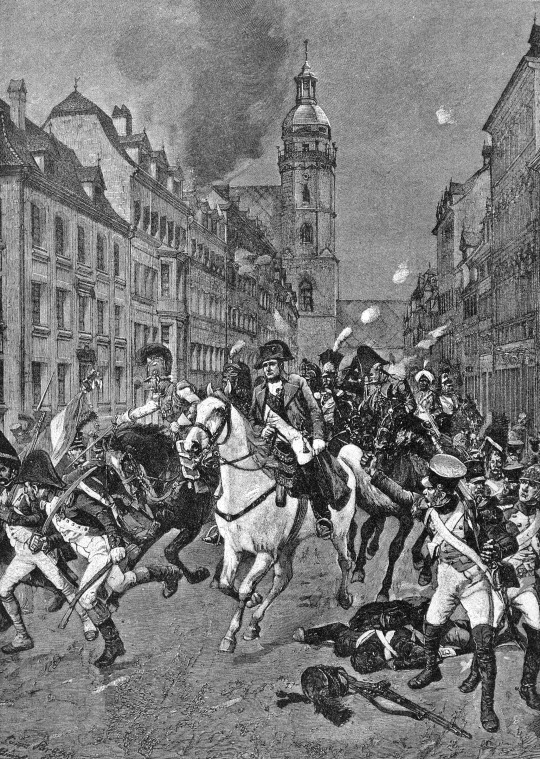
Napoleon resigns after the Battle of Leipzig, From a painting by Ludwik Braun
Having arrived in Leipzig at nine o'clock in the evening, Napoleon stayed at the hotel "At the Prussian king", where he asked Prince Józef to come. They then had, according to Baron Agathon Fain's account, the following conversation:
- Prince, you will defend the southern suburbs.
– Sire! I have very few men, most of my corps have, following Prince Berthier's orders, crossed the Elsther at night.
- How many Poles are there with you?
- My usual escort, i.e. two hundred of the Krakuses, the same number of cuirassiers, staff and several cavalry units, in total about eight hundred people.
- Well, this will be the way for you to defend the southern suburbs and cover the retreat of the army with the Prince of Tarentum… For 800 Poles are worth 8,000 other soldiers.
- Your Majesty can trust us, we will cover the retreat, even if every one of us dies!
These were the last words the prince addressed to the emperor. After saying goodbye he looked "preoccupied and sad".
What's more, that meeting was probably the last time Poniatowski and Napoleon seeing each other...
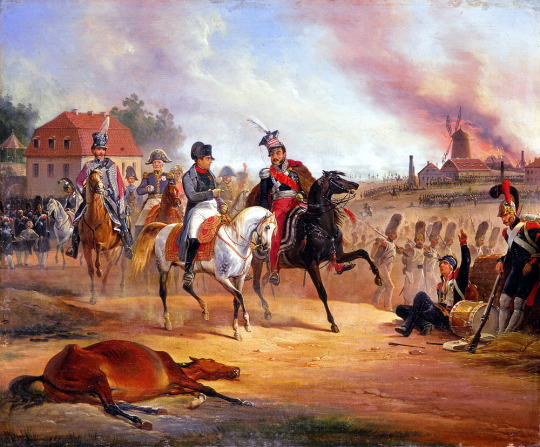
January Suchodolski, Napoleon and Józef Antoni Poniatowski at the Battle of Leipzig
On the morning of the last day of the battle, Polish troops were defending a section of the southern suburbs near the Peters Thor gate. Moreover, that time they had not only to fight the enemy, but also there intensified clashes with the locals, who were shooting at the retreating units from the windows.

Author Unknown, Prince Józef Poniatowski during the Battle of Leipzig
At about 11:00 Prince Józef found it impossible to conduct further defensive operations in this place and ordered a retreat. The Poles moved along the esplanade, where, near the Wasserkunst fountain, they fight the enemy in an organized manner for the last time.
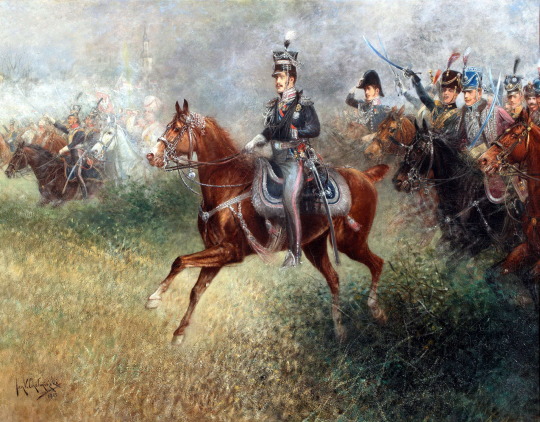
Jan Chełmiński, Prince Józef Poniatowski at the head of the troops at Leipzig
During that skirmish Poniatowski was probably wounded (probably not first time). As Klemens Kołaczkowski recalled:
He received a wound in the hand from a rifle bullet; he ordered it to be treated, got back on the horse and, holding his hand on a scarf, he did not stop fighting.
Then the Poles, having left the city walls, were looking for a crossing. The first on their way was the Pleisse River, deprived of all bridges on Napoleon's orders. Kołaczkowski:
Prince Poniatowski <…> was exposed to the fire of enemy tirailleurs, in dense troops approaching from all sides. General Bronikowski, standing next to the prince, advised him to seek salvation by swimming. But the prince answered him quickly: "One must die bravely!" (Il faut mourir en brave - AS) He ordered the rest of the escort to attack enemy tirailleurs one more time, but that managed to stop their advance only for a moment. There was not a single moment to lose! In this last resort, the prince finally followed the opinion of the officers surrounding him, mounted his horse and jumped into the river with him!
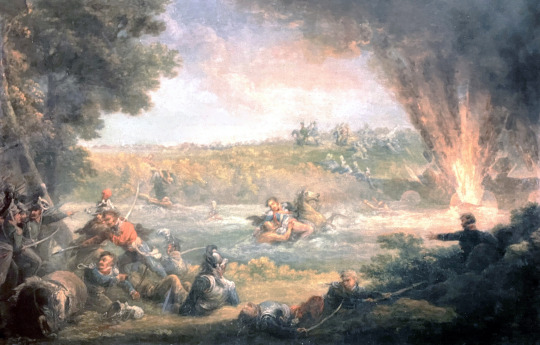
Jan Bogumił Plersch, Prince Poniatowski crossing Pleisse
The water was flooding the banks high up; the horse, carried away by its momentum, could not reach the shore. At this sight, captain Blechamps from the staff rushes after the prince, helps him swim and get to the opposite shore.
But there was one more river to cross – the Elster. Which had also been devoid of all its bridges except one. But even that one was earlier that day blown up by mistake when a significant part of the French were still on the other bank.
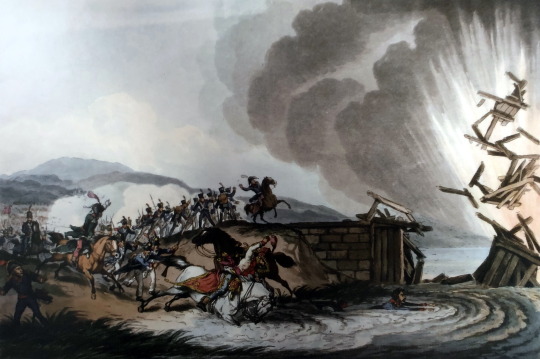
Retreat of the French from Leipzig, October 1813, an English engraving
What's more, in German Elster means "magpie". And according to legend, a gypsy woman once told Prince Joseph that he would die because of a magpie. And that's how it happened.

Tadeusz Korpal, Prince Poniatowski at Leipzig
Kołaczkowski:
The prince was walking on foot through the gardens lying between Elster and Pleisse: here, he was shot in the side by a rifle bullet for the second time and fell into the arms of the officers surrounding him. However, he soon regained consciousness and, with the help of his adjutant, mounted his horse with difficulty, swaying in the saddle. The Poles started to appeal to him to take care of himself and, handing over his command to another general, to preserve himself for the homeland. But the prince's courage seemed to increase with danger. "No! no!" he shouted "God has entrusted me with the honor of the Poles, I will only give it to God". The engineer's officer comes running and points to the most convenient place to cross; the prince, walking along the river bank, heads in that direction; but when he notices the enemy unit blocking his path, he shouts loudly: "There they are!" He turns his horse and rushes to Elster. Weakened by his wounds, he can no longer steer his horse, but the beast can only follow the current and cannot climb the high, precipitous shore. All this happened under a hail of bullets. At that final moment, the prince receives his third wound, slips from his horse and, carried away by the rush of the water, begins to sink. The good Blechamps comes to the aid again. In noble zeal, he throws himself into the river and grasps the prince. He was seen holding his arms and trying to lift the prince's head above the water, but the efforts of this noble man were in vain. They both disappeared forever in the currents of the treacherous river! Such was the death of a Polish hero, a beloved leader who preferred death to ignominious captivity.

Prince Poniatowski at Leipzig (enlarged)
According to another legend, at Leipzig prince Józef was to see the notorious White Lady of the Poniatowskis for the last time.
#józef poniatowski#poniatowski#1813#Leipzig#the battle of leipzig#napoleonic wars#napoleon bonaparte#Jan Czesław Moniuszko#Ludwik Braun#January Suchodolski#Jan Chełmiński#Jan Bogumił Plersch#Tadeusz Korpal
28 notes
·
View notes
Photo

Grande Grèce
La Grande-Grèce (Magna Graecia) désigne les régions côtières du sud de l'Italie qui furent colonisées par diverses cités-États grecques entre le VIIIe et le Ve siècle avant notre ère. La Sicile, bien qu'elle ait également été colonisée par les Grecs, n'est généralement pas incluse dans cette zone. Toutefois, des auteurs ultérieurs tels que Strabon ont inclus la Sicile dans le terme, qui en est venu à désigner l'ensemble du monde grec.
Lire la suite...
4 notes
·
View notes
Text

Skeleton DJ at Scarehouse at Pittsburgh Mills in Tarentum.
6 notes
·
View notes
Text
THIS DAY IN GAY HISTORY
based on: The White Crane Institute's 'Gay Wisdom', Gay Birthdays, Gay For Today, Famous GLBT, glbt-Gay Encylopedia, Today in Gay History, Wikipedia, and more … December 25




Sol Invictus ("the Unconquered Sun") or, more fully, Deus Sol Invictus ("the Unconquered Sun God") was the late Roman state sun god. The cult was created by the emperor Aurelian in 274 and continued until the abolition of paganism under Theodosius I. The Romans held a festival on December 25 called Dies Natalis Solis Invicti, "the birthday of the unconquered sun."
The use of the title Sol Invictus allowed several solar deities to be worshipped collectively, including Elah-Gabal, a Syrian sun god; Sol, the patron god of Emperor Aurelian (270-274); and Mithras. Oh, and a Jewish upstart named Jesus.
December 25th was also considered to be the date of the winter solstice, which the Romans called bruma. It was therefore the day the Sun proved itself to be "unconquered" despite the shortening of daylight hours. (When Julius Caesar introduced the Julian Calendar in 45 B.C.E., December 25th was approximately the date of the solstice. In modern times, the solstice falls on December 21st or 22nd.)
The Sol Invictus festival has a "strong claim on the responsibility" for the date of Christmas, according to the Catholic Encyclopedia. Solar symbolism was popular with early Christian writers as Jesus was considered to be the "sun of righteousness."
The date for Christmas may also bear a relation to the sun worship. According to the scholiast on the Syriac bishop Jacob Bar-Salibi, writing in the twelfth century:
"It was a custom of the Pagans to celebrate on the same 25 December the birthday of the Sun, at which they kindled lights in token of festivity. In these solemnities and revelries the Christians also took part. Accordingly when the doctors of the Church perceived that the Christians had a leaning to this festival, they took counsel and resolved that the true Nativity should be solemnized on that day." (cited in "Christianity and Paganism in the Fourth to Eighth Centuries", Ramsay MacMullen).

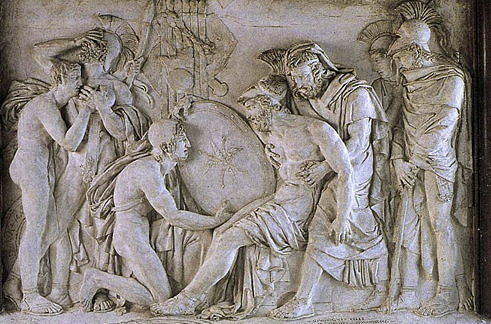
The Death of Epaminondas
418 B.C. – Epaminondas, Greek warrior and general, born (d: 362 B.C.). Considered to have been one of the great military geniuses of the ancient world, he is included here, on Christmas Day, not because of his victories in battle, but because he was revered for his moral character. He was revered, too, since he had risen from an impoverished family because of his goodness, strength and character.
Epaminondas was well educated; his musical teachers were among the best in their disciplines, as was his dance instructor. Most notably, his philosophy instructor Lysis of Tarentum (who had come to live with Polymnis in his exile) was one of the last major Pythagorean philosophers. Epaminondas was devoted to Lysis and was noted for his excellence in philosophical studies.
Not merely an academic, Epaminondas was noted for his physical prowess, and in his youth he devoted much time to strengthening and preparing himself for combat. In 385 B.C., in a skirmish near the city of Mantinea, Epaminondas, at great risk to his own life, saved the life of his future partner Pelopidas, an act thought to have cemented the life-long friendship between the two.
He was, like most Greek warriors, homosexual - but with a difference. He never married and did not produce an heir. His delight in boys was complete in itself for him. His two favorite boys, Asopichus and Leuctra, both fell in battle, as did Ep
aminondas. Both, by his order, are buried in his tomb.


1642 – Sir Isaac Newton (d.1726/27) was an English mathematician, astronomer, theologian and physicist (described in his own day as a "natural philosopher") who is widely recognised as one of the most influential scientists of all time and a key figure in the scientific revolution. His book Philosophiæ Naturalis Principia Mathematica ("Mathematical Principles of Natural Philosophy"), first published in 1687, laid the foundations of classical mechanics. Newton also made pathbreaking contributions to optics, and he shares credit with Gottfried Wilhelm Leibniz for developing the infinitesimal calculus.
Isaac Newton was born (according to the Julian calendar, in use in England at the time) on Christmas Day, 25 December 1642 (NS 4 January 1643) "an hour or two after midnight", at Woolsthorpe Manor in Woolsthorpe-by-Colsterworth, a hamlet in the county of Lincolnshire.
From the age of about twelve until he was seventeen, Newton was educated at The King's School, Grantham, which taught Latin and Greek and probably imparted a significant foundation of mathematics. He was removed from school, and by October 1659, he was to be found at Woolsthorpe-by-Colsterworth, where his mother, widowed for a second time, attempted to make a farmer of him. Newton hated farming. Henry Stokes, master at the King's School, persuaded his mother to send him back to school so that he might complete his education. Motivated partly by a desire for revenge against a schoolyard bully, he became the top-ranked student, distinguishing himself mainly by building sundials and models of windmills.
Newton's Principia formulated the laws of motion and universal gravitation that dominated scientists' view of the physical universe for the next three centuries. By deriving Kepler's laws of planetary motion from his mathematical description of gravity, and using the same principles to account for the trajectories of comets, the tides, the precession of the equinoxes, and other phenomena, Newton removed the last doubts about the validity of the heliocentric model of the Solar System and demonstrated that the motion of objects on Earth and of celestial bodies could be accounted for by the same principles. Newton's theoretical prediction that the Earth is shaped as an oblate spheroid was later vindicated by the geodetic measurements of others, thus convincing most Continental European scientists of the superiority of Newtonian mechanics over the earlier system of Descartes.
Newton also built the first practical reflecting telescope and developed a sophisticated theory of colour based on the observation that a prism decomposes white light into the colours of the visible spectrum. Newton's work on light was collected in his highly influential book Opticks, first published in 1704. He also formulated an empirical law of cooling, made the first theoretical calculation of the speed of sound, and introduced the notion of a Newtonian fluid.
Newton was a fellow of Trinity College and the second Lucasian Professor of Mathematics at the University of Cambridge. He was a devout but unorthodox Christian, who privately rejected the doctrine of the Trinity and who, unusually for a member of the Cambridge faculty of the day, refused to take holy orders in the Church of England.
Beyond his work on the mathematical sciences, Newton dedicated much of his time to the study of alchemy and biblical chronology, but most of his work in those areas remained unpublished until long after his death. Politically and personally tied to the Whig party, Newton served two brief terms as Member of Parliament for the University of Cambridge, in 1689–90 and 1701–02. He was knighted by Queen Anne in 1705 and he spent the last three decades of his life in London, serving as Warden (1696–1700) and Master (1700–1727) of the Royal Mint, as well as president of the Royal Society (1703–1727).Although it was claimed that he was once engaged, Newton never married. The French writer and philosopher Voltaire, who was in London at the time of Newton's funeral, said that he
"was never sensible to any passion, was not subject to the common frailties of mankind, nor had any commerce with women—a circumstance which was assured me by the physician and surgeon who attended him in his last moments".
The widespread belief that he died a virgin has been commented on by writers such as mathematician Charles Hutton, economist John Maynard Keynes, and physicist Carl Sagan.
Newton did have a close friendship with the Swiss mathematician Nicolas Fatio de Duillier, whom he met in London around 1689. Their intense relationship came to an abrupt and unexplained end in 1693, and at the same time Newton suffered a nervous breakdown. Some of their correspondence has survived.
In September of that year, Newton had a breakdown which included sending wild accusatory letters to his friends Samuel Pepys and John Locke. His note to the latter included the charge that Locke "endeavoured to embroil me with woemen". Items like these have led some historians to speculate that Newton was homosexual.


"Artist and Model" - John Minton
1917 – John Minton (d.1957) was a painter of landscapes, town scenes, and figure subjects in oil and watercolor, as well as an acclaimed illustrator. Minton's homosexuality was an important influence on his work. One of his main themes was the young male figure in emotionally charged settings.
Like many middle class gay men of his generation, Minton was drawn to men who fulfilled a manly ideal, and this attraction manifested itself in much of his work, where he portrayed his handsome working class lovers and other ideals of masculinity such as Guardsmen and matadors.
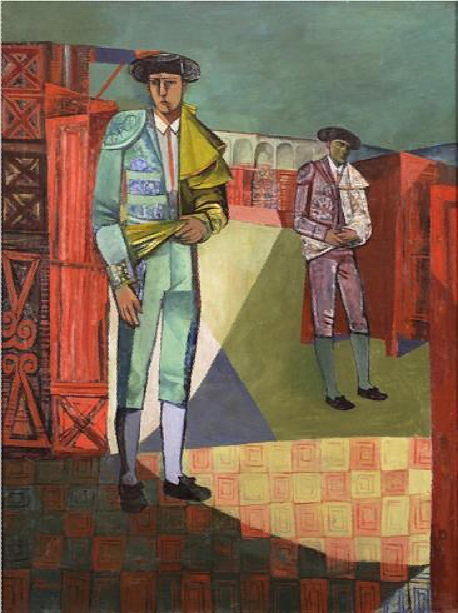
Two Bullfighters
Minton's early work focused on the urban landscape he discovered during nocturnal jaunts around London, where he also discovered an active sexual underground. Visits to Spain in 1949 and Jamaica in 1950 offered Minton a fresh repertoire of subjects and enriched his palette of colors.
Although Minton was dedicated to painting, his reputation developed as a result of his skill as an illustrator for a wide range of books, as well as for magazines such as The Listener and The Radio Times.
Between 1950 and 1952 Minton lived openly with his lover Ricky Stride, a bodybuilding ex-sailor, often his model. Theirs was a volatile relationship and ended as a result of almost constant fighting, which often resulted in violence on Stride's part.
On January 12, 1950, The Listener published a letter Minton wrote in response to a review of a new biography of Oscar Wilde which discussed Wilde's sexuality and relationship with Lord Alfred Douglas in a denigrating fashion. Outraged, Minton pointed out the enormous contribution made to society by homosexuals and highlighted the fact that "the same vicious law which imprisoned Wilde still operates" and pleaded for a "saner and more comprehensive attitude towards the homosexual in society."
Minton's character revealed some great contradictions—his wild gaiety and love of wit and banter disguised and competed with an inner melancholy that verged on depression. Towards the end of his life, Minton began to express an obsession with death, and he was particularly moved by the death of film star and symbol of disaffected youth James Dean.
Minton's last painting, which remained unfinished, was initially based upon a car crash that he had witnessed in Spain; but it also, he told his friend Ruskin Spear, represented "James Dean and all that." As a result the painting was posthumously titled Composition: The Death of James Dean in September 1955.
On January 20, 1957 John Minton committed suicide by taking an overdose of Tuinal.

1950 – Time magazine ran its first article on homosexuality. It said that homosexuals should not work in government jobs because they are a security risk.


1950 – Yehuda Poliker is an Israeli singer, songwriter, musician, and painter. Poliker first became known in the 1980s as the lead vocalist for the band Benzene. In 1985, after the band was dismantled, he began a varied solo career that included motifs from rock, pop and traditional Greek music. He is openly gay.
Yehuda Poliker (birth name: Leonidas Polikaris) was born in Kiryat Haim, a suburb of Haifa, Israel. His parents were Greek Jews and Holocaust survivors who were deported to Auschwitz from Thessaloniki.
In 1981, Poliker began his career-long collaboration with writer and producer Yaakov Gilad. Poliker's band, Benzene, released two albums: 24 Sha'ot (24 Hours) and Mishmeret Layla (Night Watch), which included hit singles such as "Hofshi Ze Legamrei Levad" ("Free Is Totally Alone"), "Geshem" ("Rain") and "Yom Shishi" (Friday). After Benzene broke up, Poliker began a solo career. In 1985, he released his first solo album, Einaim Shely (These Eyes of Mine). All of the tracks on the album were well-known Greek songs literally translated into Hebrew. In 1986, Poliker released his second solo album, Kholem Behakitz (Daydreamer). His third album, Efer VeAvak (Dust and Ashes), released in 1988, dealt mostly with the children of Holocaust survivors. It sold more than 70,000 copies, and in 2005, was rated by Ynet as number one of the top 100 best albums ever recorded in Israel.
Poliker's father, Jacko, told the story of his escape from Auschwitz in the 1988 film Because of That War (Hebrew: B'Glal Hamilhamah Hahi), which featured music by his son. The film included interviews with Yehuda Poliker and Yaakov Gilad, whose parents, Polish Jews, also survived Auschwitz.


1978 – Dylan Vox is an American actor and producer who has worked in television, film and theatre.
Vox was born in Marietta, Georgia, and was adopted one month after birth by Donna Blount. At an early age, he began riding horses and showed Western Pleasure placing in both regional and national competitions. After high school graduation, Vox received bachelor's degrees in Political Science and Journalism from the Georgia Southern University before moving to Denver, Colorado and training with Olympic Ice Dancer Carol Fox where he had some success on the national level with his partner Erin Bales. Vox retired from skating, and attended and graduated from law school.
Vox starred in the Los Angeles premiere of Debbie Does Dallas: The Musical and the world premiere of the hip-hopera "City Kid" earning a LA Stage Alliance Ovation Award nomination and a NAACP theatre award nomination.. He also was an original cast member of Hunky Dory, an original musical interpretation of the 1971 David Bowie album.
Vox appeared as himself on the reality television series Fight for Fame, Open Call, and the Spike detective series Murder. Vox has appeared in the here! cable station's gothic horror series Dante's Cove as Colin and as a series regular in here!'s vampire series The Lair also playing a character named Colin (although they are different characters).

Dylan Vox as Brad Benton
Under the name Brad Benton, Vox performed in many hard and soft gay pornographic films, including Big Timber, Blades, BuckleRoos, Desperate Husbands, Devil Inside, and Longhorns. and was nominated for over 12 GayVN Awards and 15 Grabby Awards, winning Best Supporting Actor at the GayVN Awards in 2004 and 2005 and nine Grabby awards over all.
Vox has written for a number of LGBT-themed websites and writes a blog entitled "21st - Century Vox." He currently serves as the Sports Editor and as a featured columnist for GayWired.com.

1982 – Two married US Army men are found, fully clothed, in bed together and are accused of sex. They say they only fell on the bed while drunk, but accept honorable discharges rather than fight the charges and possibly receive dishonorable discharges.


14 notes
·
View notes
Text
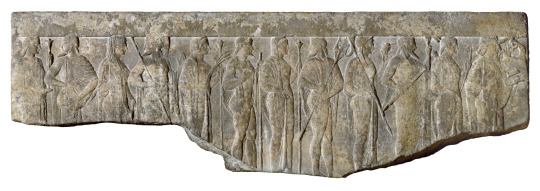
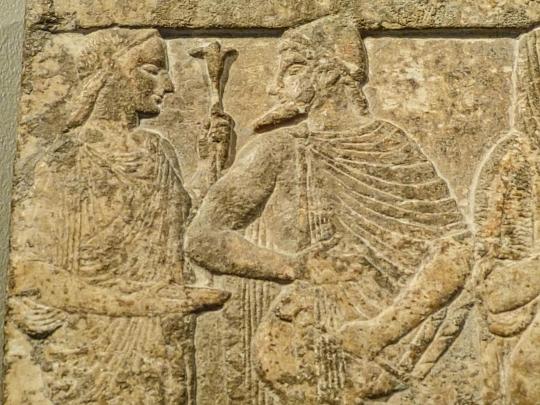
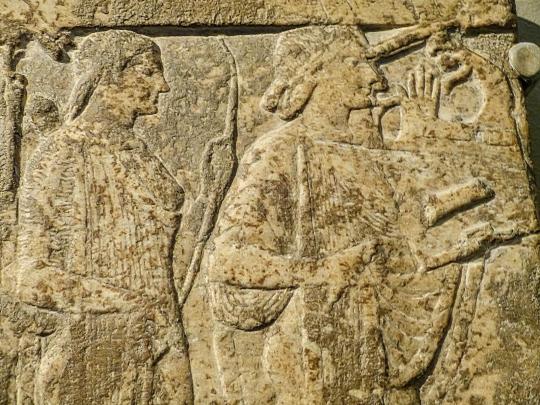
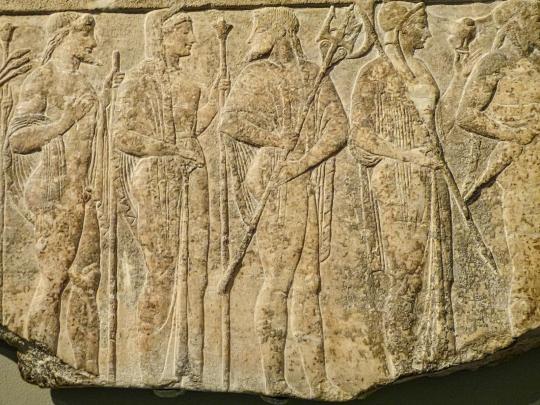

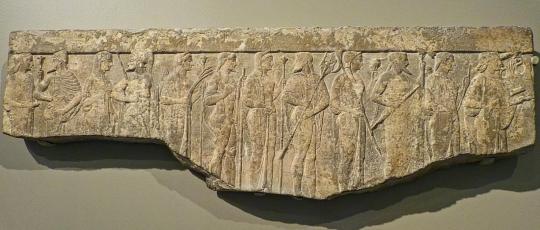
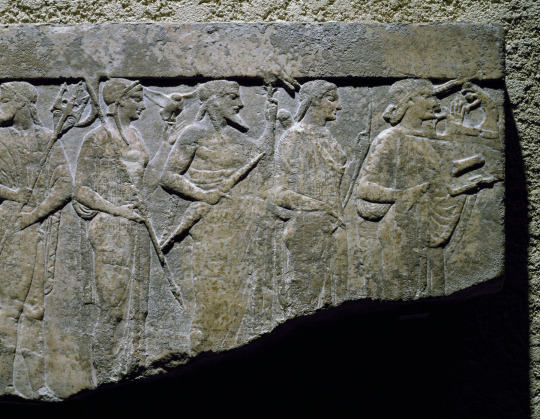
Procession of Twelve Gods and Goddesses from Taras/Tarentum 1st C. BCE - 1st C. CE. The figures from left to right are: Hestia, with scepter; Hermes, with cap and staff; Aphrodite, with veil; Ares, with helmet and spear; Demeter, with scepter and wheat sheaf; Hephaestus, with staff; Hera, with scepter; Poseidon, with trident; Athena, with owl and helmet; Zeus, with thunderbolt and staff; Artemis, with bow and quiver; and Apollo, with "kithara." Photo credit: Mary Harrsch's flickr and The Walter's Museum.
"Hestia, in the high dwellings of all, both deathless Gods and men who walk on earth, you have gained an everlasting abode and highest honor: glorious is your portion and your right. For without you mortals hold no banquet, -- where one does not duly pour sweet wine in offering to Hestia both first and last. And you, slayer of Argus (an epithet of Hermes), Son of Zeus and Maia, the messenger of the blessed Gods, bearer of the goldenrod, the giver of good, be favorable and help us, you and Hestia, the worshipful and dear. Come and dwell in this glorious house in friendship together; for you two, well knowing the noble actions of men, aid on their wisdom and their strength. Hail, Daughter of Cronos, and you also, Hermes, bearer of the goldenrod! Now I will remember you and another song also."
-Homeric Hymn 29, To Hestia
#ancient greek#magna grecia#taranto#hestia#hermes#aphrodite#ares#demeter#hephaestus#hera#poseidon#athena#zeus#artemis#apollo#museums#antiquities#artifacts
110 notes
·
View notes
Text
A Carpenter's Dedication
Anthologia Palatina 6.204 = Leonidas of Tarentum (3rd cent. BCE)
Theris, skilled with his hands, offered up to Pallas
His unbent cubit-marker; his stiff saw
Curved on its ridge; his axe and plane, both of them gleaming;
His whirling drill too – having ceased from his craft.
Θῆρις ὁ δαιδαλόχειρ τᾷ Παλλάδι πῆχυν ἀκαμπῆ,
καὶ τετανὸν νώτῳ καμπτόμενον πρίονα,
καὶ πέλεκυν ῥυκάναν τ᾽ εὐαυγέα, καὶ περιαγὲς
τρύπανον, ἐκ τέχνας ἄνθετο παυσάμενος.
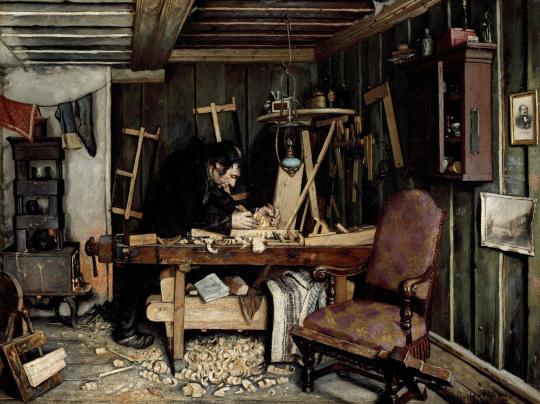
A Carpenter's Workshop, Gustav Wentzel, 1881
#classics#tagamemnon#Greek#Ancient Greek#Greek language#Ancient Greek language#langblr#translation#Greek translation#Ancient Greek translation#poem#poetry#poetry in translation#Ancient Greece#Hellenistic period#Hellenistic poetry#epigram#dedicatory epigram#Leonidas of Tarentum#Greek religion#Ancient Greek religion#Hellenic polytheism#quatrain#elegiac couplets#Anthologia Palatina#Palatine Anthology#Anthologia Graeca#Greek Anthology#Gustav Wentzel
76 notes
·
View notes
Text
"Last night the wind changed and the sky began to clear; this morning I awoke in sunshine, and with a feeling of eagerness for my journey. I shall look upon the Ionian Sea, not merely from a train or a steamboat as before, but at long leisure: I shall see the shores where once were Tarentum and Sybaris, Croton and Locri. Every man has his intellectual desire; mine is to escape life as I know it and dream myself into that old world which was the imaginative delight of my boyhood. The names of Greece and Italy draw me as no others; they make me young again, and restore the keen impressions of that time when every new page of Greek or Latin was a new perception of things beautiful. The world of the Greeks and Romans is my land of romance; a quotation in either language thrills me strangely, and there are passages of Greek and Latin verse which I cannot read without a dimming of the eyes, which I cannot repeat aloud because my voice fails me. In Magna Graecia the waters of two fountains mingle and flow together; how exquisite will be the draught!"
By the Ionian Sea: Notes of a Ramble in Southern Italy, George Gissing (1901)
#george gissing#calabria#italy#italia#south italy#southern italy#mediterranean#magna grecia#magna graecia#literature#quotes#english literature#greece#sybaris#crotone#locri#taranto#ionian sea
9 notes
·
View notes
